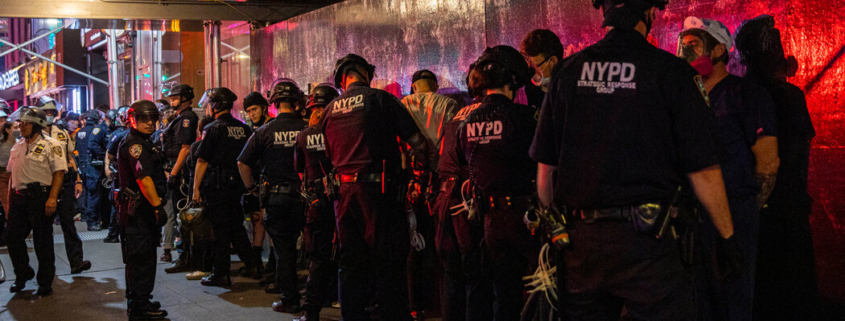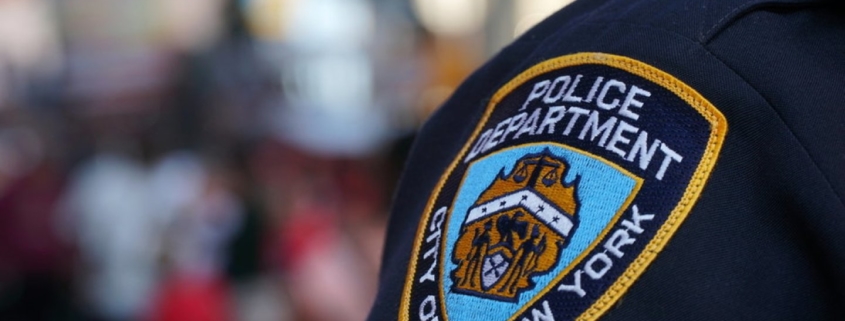A bunch of police reform efforts are underway in New York City. NYPD officers may not have been responsible for the killing that has sparked protests around the country, but they’ve provided plenty of ammo for police critics and reformers over the years.
With Mike Bloomberg no longer running front office interference for the PD, the department has found itself absorbing more un-deflected criticism. This criticism is finally turning to action, now that it’s incredibly inconvenient for ANY city to pretend its law enforcement agencies aren’t in need of an overhaul.
Early last week, NYPD Commissioner Dermot Shea decided to dismantle the NYPD’s plainclothes units. These officers didn’t look like police officers. And since they didn’t look like police officers, they didn’t behave like police officers. Removing the uniform seemed to remove all pretense of accountability as well, resulting in the so-called (and strangely-named) “anti-crime” units being the NYPD’s leader in crimes committed against citizens.
The plainclothes “anti-crime” units operated out of unmarked vehicles, and did not respond to 911 calls. Instead, they were charged with what Shea called “proactive” policing. The anti-crime teams across all 77 precincts will be disbanded.
“When you look at the number of anti-crime officers that operate within New York City, and when you look at a disproportionate, quite frankly, number of complaints, shootings—and they are doing exactly what was asked of them,” Shea said. “I think we can do better. I think that policing in 2020 is not what it was in five, ten, twenty years ago.”
While it seems strange Commissioner Shea would state that generating complaints and corpses is “exactly what was asked” of the anti-crime units, the good news is they won’t be roaming around menacing the public as a cohesive unit. The 600 officers were responsible for 31% of fatal NYPD shootings, despite only being 6% of the total police force. In recent years, “anti-crime” officers were responsible for a number of high-profile killings of citizens, including Eric Garner, whose death similarly prompted protests all over the nation. The disbanding scatters the plainclothes officers across several other units, giving more divisions a chance to be corrupted by these bad apples.
On a more positive note, the NYPD can no longer act like body camera footage is a proprietary good the public shouldn’t be allowed to have access to. The NYPD’s body camera policy — released months after the cameras were deployed (as the result of court-ordered reforms) — gave the department every excuse it wanted to never release footage.
This followed a lawsuit against the NYPD by one of the city’s police unions, which sought to block almost any release of footage ever under the state’s infamous “50-a” law, which forbids the release of police officers’ personnel files and disciplinary records. (Or at least it did… until it was taken off the books in another recent reform move.) How footage of interactions with residents fit these descriptions was left up to the Patrolmen’s Benevolent Association’s imagination.
The policy has been rewritten in light of national events. The previous version gave the NYPD up to 30 days to come up with a reason why it wouldn’t be releasing recordings. The new policy mandates the release of certain recordings within 30 days, flipping the old policy on its head.
The new policy obligates the NYPD to release and eventually publish online all audio and video of officers’ interactions that involve gunshots fired in public spaces, the deployment of tasers and the use of force that results in death or substantial bodily injury.
“Effective immediately, the NYPD’s 24,000 body cameras now have a mandatory 30 day release policy,” he tweeted Tuesday morning.
Certainly the NYPD will do everything it can to prevent release of these recordings, despite the mandate. It has two powerful unions willing to sue the city and their members’ employer over anything that might result in additional transparency or accountability. But the city’s tolerance for these unions may finally be running out. Mayor Bill de Blasio, who talked a tough police reform game while campaigning only to dial back his rhetoric once in office, is back on the warpath and calling out the unions for their contribution to the destruction of the relationship between city residents and the NYPD.
“The SBA leadership has engaged in racist activities so many times I can’t even count it,” he said of the NYPD sergeants’ union.
“I’m just sick of it, I’ve been sick of it for years,” he added. “What I’ve seen of the SBA, and too often the PBA, is efforts to divide us, to hold us back, to create all sorts of negativity, to push back progress, to undermine efforts at unity. It’s literally anti-social what these union leaders do.”
Whether these reform efforts result in lasting change remains to be seen. But it’s far more than anyone’s demanded of the NYPD in years.
Techdirt.


